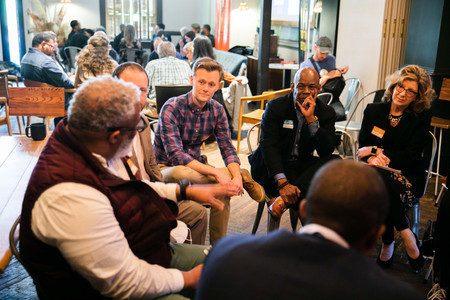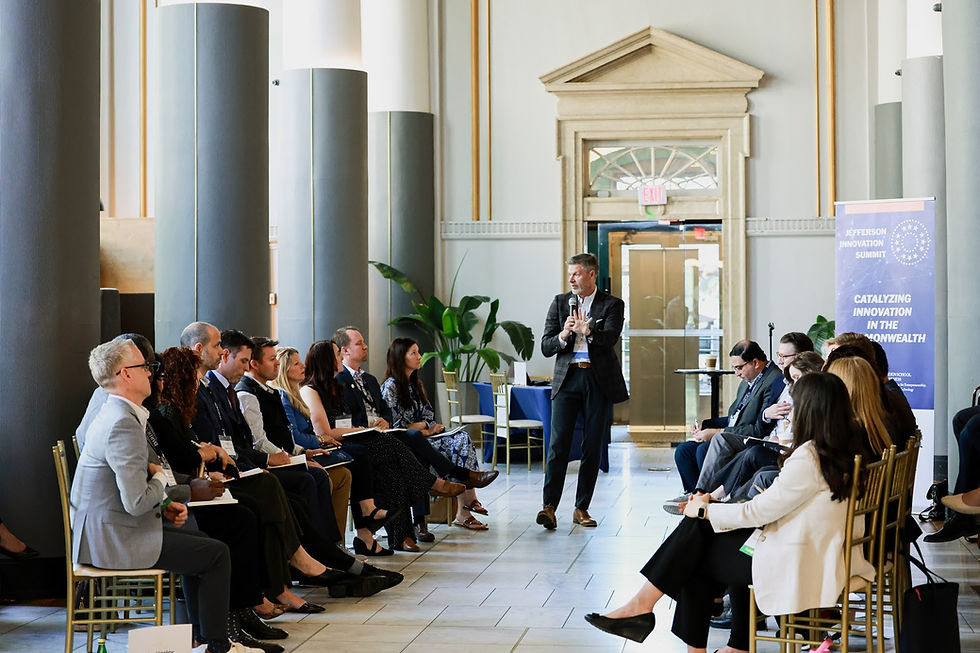Criminal Justice Reform: Mutual Aid Presentations
- Tom Tom Foundation Staff

- Nov 28, 2022
- 5 min read
Updated: Jan 30, 2023
Our Tomorrow Talks Series connects leaders to talk about the future of Charlottesville. At the 10th Annual Tom Tom Festival this April, the series featured a topical discussion on Criminal Justice Reform.
It was April 20, the first legal 420 in Virginia’s history, and over 80 people from different backgrounds --- advocates, jurists, entrepreneurs, nonprofit leaders, journalists, educators, and other community organizers --- participated. They shared ideas, and made connections to further projects related to reform policy, reentry, job services, financial literacy, and housing.

On December 1, 2022, we’re reconvening this group, to check in on relationships and projects. Some of the structure will remain the same; ample time to make connections and share stories in a small group setting. But a central focus of this follow up conversation will be hearing from a few organizations who developed ideas and are at a point to present that project to the community.
We're introducing a new format loosely labeled "Mutual Aid." These presentations will be 4 minutes long, and will conclude with a series of asks or needs that allow everyone in the room will then have an opportunity to offer support. It's not just about money or financial support! The idea is that everyone brings unique history, networks, and experience that can be useful to others. Creating this network of collaborators helps reduces competition, and reinforces how everyone is working toward similar goals. When we empower one project, it pays dividends later on for all of our projects.
This conversation is Presented in Partnership with the Fountain Fund.
There is limited capacity at the event, so advance registration is required.

MUTUAL AID PRESENTATION #1: RAP HOUSE
The Recovery And Purpose (RAP) House Foundation is built upon the experiences, strengths, and hopes of individuals with lived experiences of various forms of trauma. Departing from the unhealthy lifestyles inherent in incarceration, institutionalization, homelessness, and substance use disorders requires trauma-informed resources specifically tailored for the individual, and supportive relationships rooted in compassion, respect, and trust. With the right support, anyone with the desire to become healthy can recover, heal, and thrive. At its core, RAP is a Recovery Community Organization (RC0) run by peers, and created for peers. Members of a RAP House community meet together regularly to identify needs, resources, gaps, and learning opportunities and support one another in meeting individual and group goals. RAP House provides supportive access to vital resources through a community of caring partners who act as extended family and friends in healthy relationships that foster stability, accountability, and responsible outcomes in the transformational process.
Kevin Mellette is a certified Peer Recovery Specialist who has experienced multiple forms of trauma, including 43 years of active addiction and over a decade in the incarceration system. He ran a successful business for many years together with his wife, and is now focused on sharing the opportunities and lessons from his life to help others in the community going through what he did find their way to a better life. Kevin has dedicated himself to carrying a message of HOPE for those that have suffered and continue to suffer from mental health and substance use disorder conditions. His ultimate goal is to help create a community of compassion and connection to counter the issues that perpetuate dysfunction.
Diana Boeke has spent three decades working in the non-profit sector, starting as a residential counselor in a youth crisis shelter near San Francisco. During her three years in community engagement and donor relations at The Haven, individual donations nearly tripled. Her experience working with historically neglected and excluded populations led her to focus on systemic inequities and how traditional non-profits were actually perpetuating injustices. Diana holds a BA in African American History, and an MA in Holistic Health Education. She continues to study the intersections of social justice, nature, and embodiment with trauma and healing, and is pursuing training as a restorative justice facilitator.
MUTUAL AID PRESENTATION #2 - ALBEMARLE-CHARLOTTESVILLE RESTORATIVE JUSTICE PROGRAM
The Albemarle Charlottesville Restorative Justice Program provides a brave space for those involved in harm to lead their own accountability and healing. We divert criminal cases away from the court system and into facilitated restorative conferences. Restorative conferencing provides those impacted by harm with voice and agency to address their needs. It also offers those responsible the opportunity to take accountability and repair the harm in dialogue with those impacted. We are committed to a community-based, public health, trauma informed, and healing-centered approach; addressing personal and systemic root causes of harmful behavior; reducing overall and racially-disproportionate contact with the criminal system; and transforming the punitive culture of the agencies, organizations, and communities involved.
Ashley Cinalli-Mathews is one of the co-directors of the Albemarle-Charlottesville Restorative Justice Program. She is a Licensed Clinical Social Worker with over 15 years of experience working in this region with children, families, and adults who have experienced abuse, violence, and crime. Ashley's work experience has included investigations, advocacy, child forensic interviewing, training, facilitation, and testifying in court. After so many years working adjacent to the criminal legal system, Ashley entered the field of RJ due to a desire to offer a more individualized and empowering route to healing for those who have been harmed; and to promote a way of repairing harm that supports the well-being of all involved.

MUTUAL AID PRESENTATION #3 - ONE STOP SHOP
The “One-Stop Shop” is an efficient and convenient way to cover a wide range of needs of those who are formerly incarcerated. The events include food, music and access to services offered by many agencies and organizations such as OAR, Region Ten, Goodwill Industries, New Beginnings, and the Fountain Fund. By combining this variety of organizations and services, we help ensure that when these individuals are released from prison, they will not return.
The OSS started this summer when the state of Virginia’s Earned Sentence Credit law became effective on July 1, 2022. This law provided an opportunity to incarcerated individuals to reduce their sentences by participating in prison programs and demonstrating good behavior. Most of the individuals who qualified for this early release program were those who had been in prison the longest. The Charlottesville Albemarle Reentry Council (CARC) recognized that these individuals would require a wide range of needs and services upon reentering their Virginia communities. In response to this need, a committee of the CARC planned and implemented the One Stop Shop (OSS).
Cathy Ames Turner is a pastor and scholar-activist who walks with individuals and families affected by mass incarceration in and around Charlottesville, Virginia. Born in Charlottesville and raised in Baltimore, Cathy has served as an administrative specialist at the University of Virginia for 20 years and she is days away from completing her doctoral studies at Fielding Graduate University. Along with her husband, Tony, Cathy is launching an organization to focus on healing and relational reintegration for incarcerated and formerly incarcerated individuals in collaboration with local agencies, community-based organizations, and reentry professionals in Central Virginia. One such collaboration to which she is deeply committed is with the One Stop Shop -- a local, grassroots response to the needs of individuals coming home from incarceration as well as individuals that just need help with securing the basic necessities of life. Cathy serves as a member of the administrative team for the One Stop Shop.

The Fountain Fund increases economic opportunities for formerly incarcerated people to improve their lives and remain in their communities. We provide low-interest loans and financial coaching to formerly incarcerated people, helping them build credit and achieve their self-determined goals. The Fountain Fund also advocates for public policy that increases economic opportunities and reduces obstacles for formerly incarcerated people.






